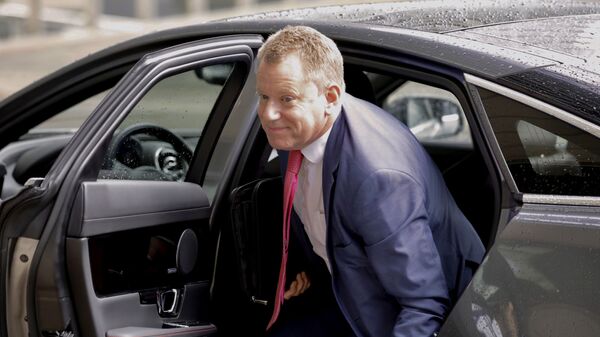British and European Union negotiators will have their first trade talks on Wednesday, 15 April, since the post-Brexit process was interrupted by the coronavirus pandemic.
A face-to-face meeting between the EU’s chief negotiator Michel Barnier and David Frost, representing Britain, had to be called off on 18 March as Europe was caught up in the coronavirus crisis.
On 15 April Mr Barnier and Mr Frost will have a virtual meeting, expected to take place using Zoom, Skype, or a similar technology, but they are not believed to be planning to discuss the question of extending the transition period beyond the end of December.
Back in my office today @EU_Commission with my team preparing, among other things, the videoconference with @DavidGHFrost tomorrow 🇪🇺 pic.twitter.com/YYo6WleIjM
— Michel Barnier (@MichelBarnier) April 14, 2020
An awful lot has changed in the last four weeks.
On 19 March Mr Barnier confirmed he had tested positive for COVID-19 and Mr Frost later went into self-isolation after displaying symptoms.
Last week, British Prime Minister Boris Johnson spent several nights in an intensive care unit after his own coronavirus symptoms worsened. He is now out of intensive care but Foreign Secretary Dominic Raab continues to run the UK government's day-to-day operations while he convalesces.
1/2 I want to reassure everyone that UK-EU contacts have been continuing in these difficult times. We have remained in touch throughout, both sides have exchanged legal texts, and last week we had a series of conference calls to explore & clarify technicalities.
— David Frost (@DavidGHFrost) April 7, 2020
European Commission chief Ursula von der Leyen and Mr Barnier both tweeted best wishes to Mr Johnson last week.
Britain has had 12,107 deaths from the coronavirus and several EU countries have suffered even worse death tolls - notably Italy, Spain, and France which have together lost more than 50,000 people.
It remains to be seen whether the shock of the devastation from the virus will have an impact on the post-Brexit trade talks.
In February Mr Johnson was taking a very hard line and insisting the UK would not accept any EU rules as part of a trade deal.
UK published excellent & reasonable Future Relationship with #EU paper on 27th Feb.
— #Brexit #AustraliaDeal #WTO #Leave #EU (@astro_trader) April 9, 2020
We are not seeking to reinvent the wheel.
Free Trade Canada style deal
OR
Australian style no-deal where EU pays £12 Billion a year extra in tariffs on its goods & UK pays only £5 Billion.#Brexit https://t.co/7NxdWkcpjB
Mr Johnson said he wanted the same deal Canada has with the EU - import tariffs on most goods have been eliminated, although there are still customs and VAT checks.
In a speech on 3 February, Mr Johnson said the UK might well revert to World Trade Organisation (WTO) terms if Mr Barnier refused to agree to a Canada-style free trade agreement.
Mr Johnson said: "We have often been told that we must choose between full access to the EU market, along with accepting its rules and courts on the Norway model, or an ambitious free trade agreement, which opens up markets and avoids the full panoply of EU regulation, on the example of Canada".
After Boris Johnson speaks of the great debt he owes to the NHS, medical staff across the UK agree that about £350 million a week should cover it.
— Have I Got News For You (@haveigotnews) April 14, 2020
The British government and the EU are both concentrating on the coronavirus crisis and it remains to be seen whether either will have softened their stance on the trade talks.
The Office for Budget Responsibility said on Tuesday, 14 April, that Britain’s economy could shrink by 35 percent by June.
Most construction and economic activity is at a standstill in the UK with large numbers of businesses closed down, working from home, or putting staff on government-subsidised furloughs.
The economic forecasts are horrific – GDP set to fall 30% in current quarter.. Business has gone off a cliff. Food banks are indicating real shortages and confidence is short. Surely time has come to finally park Brexit talks to take away at least one uncertainty
— Dick Newby (@RichardNewby3) April 6, 2020
The Chancellor Rishi Sunak - who only took over in February when his predecessor Sajid Javid resigned after a row with Mr Johnson and his political strategist, Dominic Cummings - is keen for the economy to bounce back after the coronavirus crisis later this year and a failure to get a trade deal with the EU could impact that process.
The Brexit treaty, which was agreed by Mr Johnson and the EU in October of last year, includes the option of extending the transition period for up to two years which would keep the UK in the EU single market and customs union until the end of 2022.
But Mr Johnson and Mr Cummings are keen to “unleash Britain’s potential” and believe that being restrained in such political and economic handcuffs would be a severe impediment to the UK’s chances of striking out on its own.
It remains to be seen what will come of Wednesday’s talks between Mr Barnier and Mr Frost and it may be misleading to expect the pair to suddenly see eye-to-eye in the wake of the shock of the coronavirus crisis.


